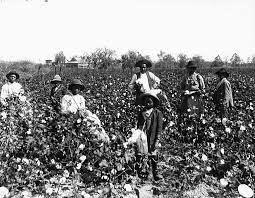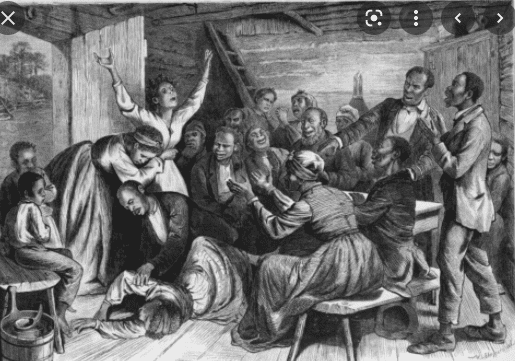Kayla Roddey, Mariah Wolfe
A spiritual is a religious folksong. Negro Spirituals came about during American Chattel slavery as representations of what had become Africanized Christianity. Some spirituals reflected the slaves’ suffering and were called sorrow songs, while others were hopeful and joyous, often referred to as jubilees. Others were sung to pass time in the fields, calling them work songs.
There are several distinct elements of negro spirituals. Things like ring shout and call and response have origins in slavery and are common in these songs.


Swing Low, Sweet Chariot- Swing Low, Sweet Chariot is said to be referring to the ascent into heaven that slaves have to look forward to in the next life.
Lyrics:
Swing low, sweet chariot
Coming for to carry me home,
Swing low, sweet chariot,
Coming for to carry me home.
I looked over Jordan, and what did I see
Coming for to carry me home?
A band of angels coming after me,
Coming for to carry me home.
Sometimes I’m up, and sometimes I’m down,
(Coming for to carry me home)
But still my soul feels heavenly bound.
(Coming for to carry me home)
The brightest day that I can say,
(Coming for to carry me home)
When Jesus washed my sins away.
(Coming for to carry me home)
If I get there before you do,
(Coming for to carry me home)
I’ll cut a hole and pull you through.
(Coming for to carry me home)
If you get there before I do,
(Coming for to carry me home)
Tell all my friends I’m coming too.
(Coming for to carry me home)
Swing low, sweet chariot
Coming for to carry me home,
Swing low, sweet chariot,
Coming for to carry me home.
Wade in the Water
It is said that Harriet Tubman used the song “Wade in the Water” to tell escaping slaves to get off the trail and into the water to make sure the dogs slave catchers used couldn’t sniff out their trail. People walking through water did not leave a scent trail that dogs could follow.
Lyrics:
Wade in the Water, wade in the water children.
Wade in the Water. God’s gonna trouble the water.
Who are those children all dressed in Red?
God’s gonna trouble the water.
Must be the ones that Moses led.
God’s gonna trouble the water.
Who are those children all dressed in White?
God’s gonna trouble the water.
Must be the ones of the Israelites.
God’s gonna trouble the water.
Who are those children all dressed in Blue?
God’s gonna trouble the water.
Must be the ones that made it through.
God’s gonna trouble the water.
Sometimes I feel like a Motherless Child- This song is simply meant to convey the heaviness of the hopelessness, despair, and pain that slaves felt.
Sometimes I feel like a motherless child
Sometimes I feel like a motherless child,
Sometimes I feel like a motherless child,
Sometimes I feel like a motherless child,
A long way from home, a long way from home.
Sometimes I feel like I’m almost done,
Sometimes I feel like I’m almost done,
Sometimes I feel like I’m almost done,
And a long, long way from home, a long way from home.
True believer,
True believer,
A long, long way from home,
A long, long way from home.
He’s Got the Whole World In His Hands- This song is meant to express that although there are hard times, there is someone greater than them that they can turn to.
He’s got the whole world in his hands.
He’s got the whole wide world in his hands.
He’s got the whole world in his hands.
He’s got the whole world in his hands.
Impact
Today, negro spirituals play an important role in the African American community. It allows them to connect with the history of bondage that their ancestors experienced. The spirituals are the foundation of some of the commonly known genres we use today such as jazz, blues, and r&b.
The Jubilee Singers of Fisk University (Nashville, Tennessee) were a chorus of former slaves that went on to change black American music forever. The group went on tour in the U.S. and Europe to perform spirituals. This group however did spark some controversy, as some African-Americans were against continuing traditions from slavery. The Jubilee Singers’ performances were so powerful and beautiful that a lot of African-Americans who were once not fond of the idea of the group completely changed their viewpoint. The Jubilee singers inspired many other groups similar to them. Their influence has evolved into the concert hall style which still is very respected today.
When traditional and solo gospel became prominent in the 20th century, many artists began to record and make popular these negro spirituals. Prominent black gospel singers such as Mahalia Jackson, Odetta and Etta James have all recorded various negro spirituals.

